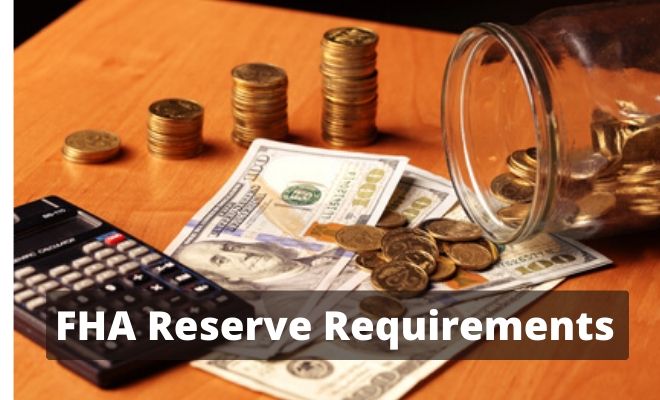FHA Reserve Requirements 2024

When searching for the right mortgage for a home, many home buyers are told they will need to prepare themselves financially for the purchase. This includes the down payment, closing costs and also the reserves.
The FHA reserve requirements will be different than a conventional loan and depending upon your situation, you may not be required to have reserves.
FHA guidelines do not require reserves to qualify for an FHA loan. However, if you have a low credit score or a high debt to income ration, FHA lenders may ask for up to two months’ reserves.
Months of Reserves Needed For Each Loan Type
| Loan Type | 1-2 Units | 3 Units | 4 Units |
| FHA | 0 | 3 | 3 |
| VA | 0 | 6 | 6 |
| USDA | 0 | 0 | 0 |
| Conventional | 0-6 | 0-6 | 0-6 |
*Conventional loans will vary based upon your credit score and loan to value ratio
Click to Get a Quote or Pre-Approved by an FHA Lender
What are Reserves and What Can Be Used for Reserves
Reserves are defined as remaining liquid assets after closing excluding any cash that you may have received during the closing transaction. It also excludes the items referenced below in the “what cannot be used for reserves” section.
Here are the most common acceptable sources to meet your lender’s FHA reserve requirements if needed:
- Funds from a savings account
- Funds from a checking account
- Funds from a money market account
- Stocks that can be liquidated
- Mutual funds that can be liquidated
- Bonds
- Certificates of Deposit
- Pending tax refunds from the IRS
- Cash (which would need to be deposited in the bank)
- 60% of the balance from your 401k, IRA, thrift savings plan or Keogh account
When you review this list, you can see that it may be fairly easy to meet the FHA reserve requirements if your lender needs them
What Cannot be Used for Reserves
Funds and/or “assets” that are not to be considered as cash reserves include:
- Gift funds
- equity from another property
- borrowed funds
- cash received at closing in a cash-out refinance transaction
- Incidental cash received at closing in the loan transaction.
- Seller contributions
When you review this list, it essentially means the FHA reserves must come from your own funds or liquid assets. They cannot be funds that are generated by the home purchase or mortgage process.
FHA Reserve Requirements for Multi-Unit Properties
There is no standard reserve requirement for FHA loans on 1-2 unit properties. However, 3-4 unit properties typically require three months of PITI. If you are thinking about purchasing a multi family home, we suggest you read our article on the FHA multi family home guidelines.
Reserves Needed When the DTI is Greater than 43%
The standard maximum DTI for an FHA loan is 43%. However, the guidelines do permit lenders to allow for a much higher DTI if the borrower meets various compensating factors. These factors may include a high credit score for example
For borrowers who do not meet any compensating factors, the reserve requirements are 3 months for 1-2 units, and 6 months for 3-4 unit properties.
If you would like to fully understand what compensating factors are and whether you are eligible, read our article on FHA Loan Requirements.
Reserves for Manually Underwritten Mortgage Applications
All manually underwritten loans must meet or exceed the following minimum reserve requirements:
- 1 and 2 Unit Properties. Reserves must equal or exceed one total monthly mortgage payment.
- 3 and 4 Unit Properties. Reserves must equal or exceed three total monthly mortgage payments.
This new policy replaces the current 2-month minimum reserve requirement for one and two unit properties for borrowers with insufficient credit.
Reserves used as Compensating Factors
When portions of a borrower’s loan application are questionable, compensating factors can help to get the mortgage approved. Where borrowers have low credit scores or a high DTI, having many months of reserves will go a long way to overcoming those challenges and may likely result in a loan approval.
Related Questions
Why do Lenders Require Reserves?
Lender will ask for reserves to give them confidence that you will be able to make your mortgage payments if you run into a short term financial hardship. For example, if you lose your job and need a month or two to find a new one.
Another example is if you have an unexpected medical emergency or suddenly need to replace the transmission on your car. These sudden expenses could result in late mortgage payments if you have no reserves.
Can Cash Out Funds be Used as Reserves?
If you are applying for a cash out refinance, the funds that you are cashing out cannot be used towards your reserve requirements.
How Many Months of Reserves are Needed for a Multi Family Home?
FHA reserve requirements for 1-2 units are the same at no reserves required. However, for a 3-4 unit property, you will need 3 months of reserves.
Does a 401k Count Towards Cash Reserves?
The FHA guidelines will allow up to 60% of your 401k account balance to count towards your cash reserve requirements.
Can the Required Cash Reserves be Gifted?
You cannot receive gift funds for the purpose of meeting the cash reserve requirement. You also cannot use any excess down payment gift funds towards reserves.
Related Articles
FHA Mortgage Insurance Information
